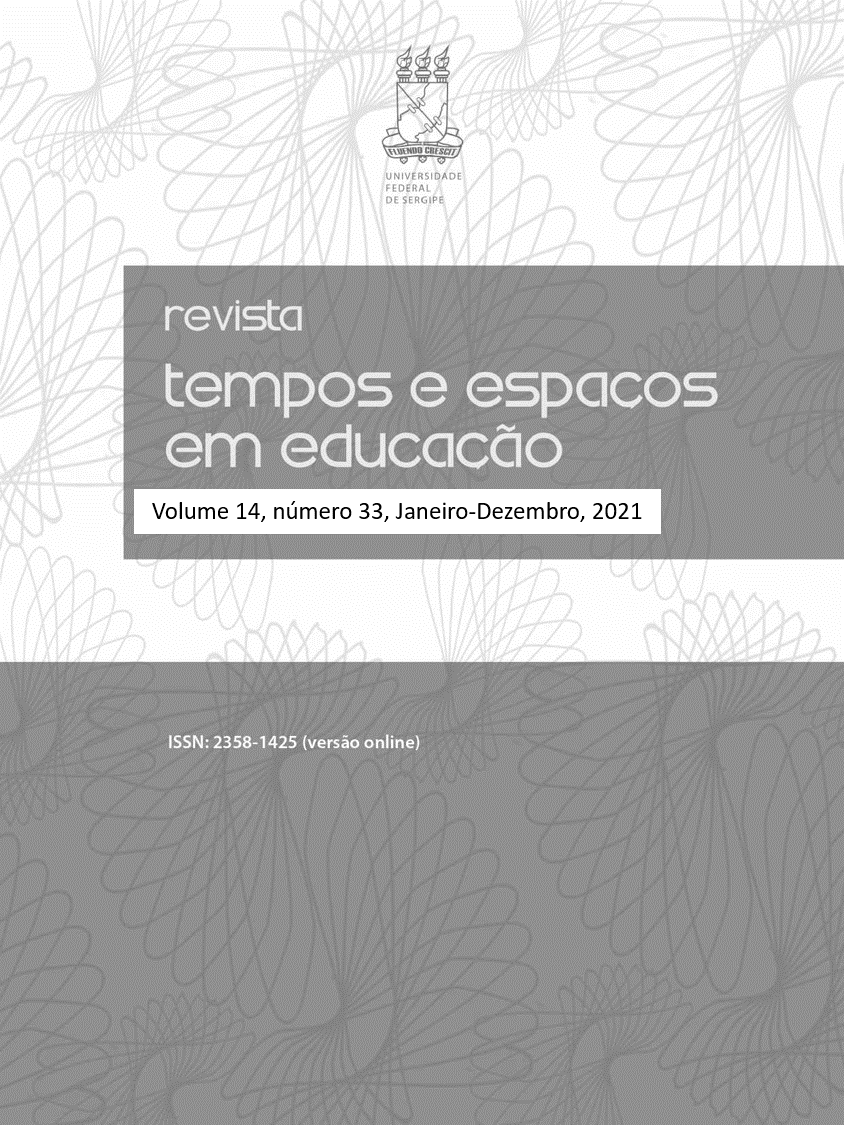Alfabetización digital de profesores dentro de Covid-19
DOI:
https://doi.org/10.20952/revtee.v14i33.16853Palabras clave:
TIC, Internet, Educación, Digitalización, Aprendizaje En LíneaResumen
El artículo está dedicado al estudio de la competencia digital de los profesores de la rama Surgut de la Universidad Industrial de Tyumen, así como a su opinión sobre la viabilidad de introducir las TIC en la estructura de la educación de los estudiantes. A partir de la encuesta, se identificaron las formas de las TIC utilizadas por los docentes, se destacaron las principales características de las TIC utilizadas en el proceso de enseñanza de las diferentes disciplinas, el nivel de digitalización del proceso educativo. La investigación se llevó a cabo sobre la base de la Universidad Industrial de Tyumen. El procedimiento de recopilación de datos incluyó un cuestionario que contenía 13 preguntas, de las cuales 11 eran cerradas, con opciones sugeridas y 2 abiertas. A partir de los datos obtenidos se identificaron las dificultades encontradas por los docentes, que impiden introducir tecnologías modernas en el proceso de aprendizaje. El artículo plantea la idea de cambiar el enfoque de la formación de profesores para el proceso de implementación de las TIC. Se llega a la siguiente conclusión de que los datos obtenidos permiten reformar la estrategia de actividad educativa.
Descargas
Citas
Ghavifekr, S., Kunjappan, T., Ramasamy, L., & Anthony, A. (2016). Teaching and Learning with ICT Tools: Issues and Challenges from Teachers' Perceptions. Malaysian Online Journal of Educational Technology, 4(2), 38-57. https://eric.ed.gov/?id=EJ1096028.
Ilyina, E. A., Shchiptova, A. V., Poverinov, I. E., Grigoreva, S. V., Gorshkova, N. K., & Fisunov, P. A. (2019). Features of the Development of the Digital Educational Environment in Russia. International Journal of Higher Education, 8(7), 121-131. https://doi.org/10.5430/ijhe.v8n7p121.
Kaban, A. L., & Aşçı, S. (2021). COVID-19 Chronicles in Education: Overcoming Global Pandemic Challenges in Turkey by Empowering Educators to Become Digitally Literate. In New Student Literacies amid COVID-19: International Case Studies. Emerald Publishing Limited. https://doi.org/10.1108/S2055-364120210000041016.
Krainov, G. N., Panov, A. I., & Zubkov, S. A. (2021). Challenges of digitalization for higher education in Russia. In SHS Web of Conferences (Vol. 103, p. 02011). EDP Sciences.
Kryukov, V. V., & Shakhgeldyan, K. I. (2012). Information technology at the university: strategy, trends and experience. University Management: Practice and Analysis.
Livingstone, S. (2012). Critical reflections on the benefits of ICT in education. Oxford review of education, 38(1), 9-24. https://doi.org/10.1080/03054985.2011.577938.
Mikheev, A., Serkina, Y., & Vasyaev, A. (2021). Current trends in the digital transformation of higher education institutions in Russia. Education and Information Technologies, 1-15. https://doi.org/10.1007/s10639-021-10467-6.
Miranda, G. L. (2007). The limits and possibilities of ICT in education. adventure in the search for knowledgewith Sisyphusfate of incessantly restarting the same task.”. http://hdl.handle.net/10451/2824.
Osina, D. M., Tolstopyatenko, G. P., & Malinovsky, A. A. (2020, May). Digitalization of higher legal education in russia in the age of covid-19. In International Scientific and Practical Conference (139, 392-398). Springer, Cham. DOI https://doi.org/10.1007/978-3-030-53277-2_47.
Pelgrum, W. J. (2001). Obstacles to the integration of ICT in education: results from a worldwide educational assessment. Computers & education, 37(2), 163-178. https://doi.org/10.1016/S0360-1315(01)00045-8.
Priyadarshini, A., & Bhaumik, R. (2020). E-readiness of Senior School Learners to Online Learning Transition amid COVID-19 Lockdown. Asian Journal of Distance Education, 15(1), 244-256. Retrieved from https://www.asianjde.com/ojs/index.php/AsianJDE/article/view/456.
Purnama, S., Ulfah, M., Machali, I., Wibowo, A., & Narmaditya, B. S. (2021). Does digital literacy influence students’ online risk? Evidence from Covid-19. Heliyon, 7(6), e07406. https://doi.org/10.1016/j.heliyon.2021.e07406.
Ronzhina, N., Kondyurina, I., Voronina, A., Igishev, K., & Loginova, N. (2021). Digitalization of Modern Education: Problems and Solutions. International Journal of Emerging Technologies in Learning, 16(4).
Rozhkova, D., Rozhkova, N., & Blinova, U. (2020). Digital universities in Russia: digitization with extra speed. J. Digit. Sci., 2(1), 76-81. https://doi.org/10.33847/2686-8296.2.1_7.
Sá, M. J., & Serpa, S. (2020). COVID-19 and the Promotion of Digital Competences in Education. Universal Journal of Educational Research, 8(10), 4520-4528.
Sánchez-Cruzado, C., Santiago Campión, R., & Sánchez-Compaña, M. (2021). Teacher Digital Literacy: The Indisputable Challenge after COVID-19. Sustainability, 13(4), 1858. https://doi.org/10.3390/su13041858.
Shcherbakova, I. O., Belozerova, N. V., & Mahmudova, T. V. (2021, February). Blended learning as a tool for professional training of specialists for the Arctic region: modern practices in the context of digitalization of education. In IOP Conference Series: Earth and Environmental Science (Vol. 678, No. 1, p. 012012). IOP Publishing. https://doi.org/10.1088/1755-1315/678/1/012012.
Soldatova, G., Zotova, E., Lebesheva, M., & Shlyapnikov, V. (2013). Cifrovaya gramotnost’i bezopasnost’v internete: Metodicheskoe posobie dlya specialistov osnovnogo obshchego obrazovaniya [Digital literacy and Internet safety: A manual for specialists in basic general education]. Moscow: Google.
Tejedor, S., Cervi, L., Pérez-Escoda, A., & Jumbo, F. T. (2020). Digital literacy and higher education during COVID-19 lockdown: Spain, Italy, and Ecuador. Publications, 8(4), 48. https://doi.org/10.3390/publications8040048.
Zemtsov, S., Barinova, V., & Semenova, R. (2019). The risks of digitalization and the adaptation of regional labor markets in Russia. Форсайт, 13(2 (eng)).
Zulkarnain, Z., Heleni, S., & Thahir, M. (2020, October). Digital literacy skills of math students through e-learning in COVID-19 era: a case study in Universitas Riau. In Journal of Physics: Conference Series (Vol. 1663, No. 1, p. 012015). IOP Publishing. https://doi.org/10.1088/1742-6596/1663/1/012015.
Descargas
Publicado
Cómo citar
Número
Sección
Licencia
À Revista Tempos e Espaços em Educação ficam reservados os direitos autorais pertinentes a todos os artigos nela publicados. A Revista Tempos e Espaços em Educação utiliza a licença https://creativecommons.org/licenses/by/4.0/ (CC BY), que permite o compartilhamento do artigo com o reconhecimento da autoria.



